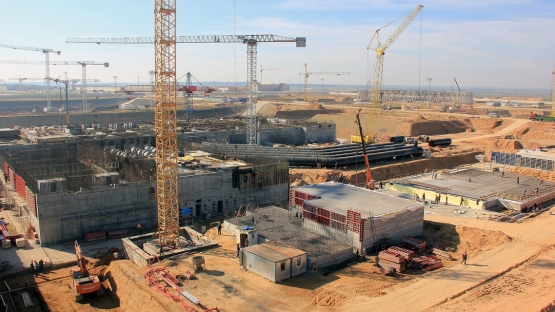Representatives from 38 Member States will gather tomorrow at an annual IAEA meeting to take stock of recent developments and to share experiences on building the necessary infrastructure on which safe and sustainable nuclear power programmes would be based.
The Technical Meeting on Topical Issues in the Development of Nuclear Power Infrastructure, to last until 6 February, is expected to attract more than 90 managers and senior officials from governments, regulatory bodies and utilities, as well as the Organisation for Economic Co-operation and Development and the Institute of Nuclear Power Operations. The meeting is the main annual forum for IAEA Member States that are considering, planning or expanding a nuclear power programme.
"Sharing challenges, lessons learned and peer reviews provide unique opportunities for fostering a culture of continuous improvement," said Mikhail Chudakov, who took up his post today as the IAEA Deputy Director General and Head of the Department of Nuclear Energy. "That is one of the pillars of the nuclear field."
"The Agency's projections show that nuclear power is likely to continue to grow steadily," he added. "In the next five years, there may be as many as five countries to start constructing their first nuclear power plants."
Building or expanding the national infrastructure for nuclear power is a very complex endeavour that usually takes 10 to 15 years of multi-disciplinary planning and implementation. Hence, the annual meeting allows the participants to discuss specific infrastructure development issues. Plenary and breakout sessions will zoom in on topics such as energy planning, siting, financing, legislative and regulatory frameworks, establishing and building competence in the future owner-operator and safety culture. This year's meeting will also include a special focus on Turkey with presentations by representatives of the government, regulatory body, and two utilities that are planning projects.
Currently, 30 countries operate nuclear power plants, and about the same number are interested in adding nuclear in their energy mix, the so-called newcomers. Nuclear power provided close to 11% of world electricity production in 2013. Of the 30 operating countries, 13 are either constructing new reactors or actively completing previously suspended constructions. Another 12 are actively planning to either construct new plants or to complete suspended construction projects. On the newcomers front, Belarus started constructing its second unit at the Ostrovets site, and the United Arab Emirates began constructing its third unit at the Barakah Nuclear Power Plant in 2014. Bangladesh, Jordan, Poland, Turkey and others are progressing on the path to nuclear power.
Meeting participants will hear about the status and plans of these and other countries that consider the nuclear power option. Countries with established nuclear power programmes, such as the UK, China, France, Japan, the Republic of Korea, the Russian Federation and the USA will share their experiences on industrial involvement, stakeholder involvement and building competence.
"The Agency is there to serve our 162 Member States and we do not try to influence their decisions in any way," IAEA Director General Yukiya Amano recently told an audience in Singapore. "But for countries that choose nuclear power, our job is to help."
The IAEA offers a set of integrated services tailored to the needs of its Member States with both existing and new nuclear power programmes. They include energy planning, review missions to assess a country's national nuclear infrastructure development, and nuclear energy system assessments, as well as human resource development and nuclear knowledge management.



